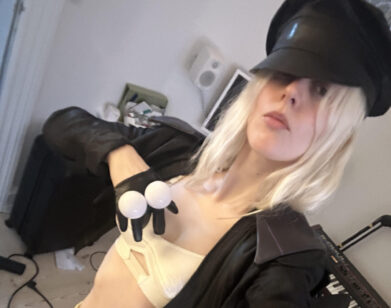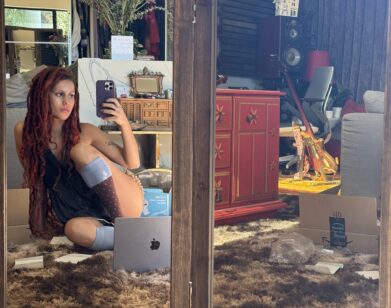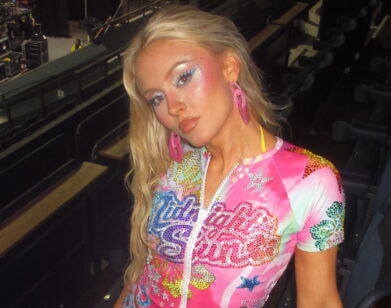Jessica Lea Mayfield’s Headspace

ABOVE: JESSICA LEA MAYFIELD
Jessica Lea Mayfield’s sophomore album, 2011’s Tell Me, was a spectacular piece of singer-songwriter fare, the soundtrack of a young woman entering adulthood, led by Mayfield’s plaintively angelic vocals and lyrics of introspection, self-examination, and personal strength. For her latest record, however, the Kent, Ohio native has taken a striking left turn. Make My Head Sing… finds Mayfield having stripped her band down to a power trio—herself, her husband and bassist Jesse Newport, and drummer Matt Martin—and slathered her songs in Black Sabbath-esque guitar riff and fuzz. Recent interviews have found her disowning her past work and presenting Make My Head Sing… as the record that finally shows her as she is.
From the opening slow, blistering guitar riff of the album’s first track, “Oblivious,” it is clear that Mayfield has turned over a new, more sinister leaf. YouTube search one of her SXSW performances from 2014, some of the first shows she performed with the new setup, and you will find a similar take. Mayfield sat down with Interview prior to her album’s April 15 release to talk about where she has been and who she is now. It’s certainly been a while since she was the young girl who toured with her family bluegrass band at eight years old; but despite her past endeavors, Mayfield sounds like she’s finally arrived.
FRANK VALISH: Is it a nervous process for you, the anticipation of getting out there and touring?
JESSICA LEA MAYFIELD: I like it, just because I have more of a schedule. I like a good mix of being gone and then coming back for a little bit. I don’t like being here for too long, because it just gets stagnant.
VALISH: I love the album. But I wanted to start out by saying that I read an interview with you where you said that Make My Head Sing… feels to you like your first record. What do you mean by that?
MAYFIELD: I feel like, with the last two records, I was in a transitional state in my life, just as anyone is when they are in their teens and early 20s. Even during those points when I was enjoying recording and working on music, I knew that I hadn’t grown into myself completely yet. And I feel like now I’m in a place where I know what I want to do and I have a clearer idea of who I am for the first time in my life. I feel like this is the first record that I’ve made as who I grew into.
VALISH: How old were you when you wrote Tell Me?
MAYFIELD: On Tell Me, I was probably, 18, 19, 20. There was some stuff left over from when I recorded With Blasphemy. I think a song or two that didn’t get on that record, ended up being on Tell Me. And then that record came out when I was 20.
VALISH: What sort of place were you in artistically at the time you wrote and recorded that album, and how do you feel different today?
MAYFIELD: I guess I have more of a clearer idea now as to what truly affects me and what is important, the things that I really like. My tastes have settled. At that age, I was constantly flip-flopping around with everything I listened to and it was all so different and varied. There are those ages where you listen to things because it’s cool or whatever, but then you get to a point where you’re just like, I really don’t give a shit. I think what I think is cool. I don’t have to like Led Zeppelin because everybody likes Led Zeppelin. I can just be completely opinionated. That was what was fun about making this record. Every idea that I wanted to hear, I got to hear it. I got to rent a studio and have my husband there to make every idea that I wanted to hear possible for me to hear it. When you’re working with other people, you don’t always get the perversion of just everything you want to hear.
VALISH: There was maybe a little more guidance on the last two albums?
MAYFIELD: Yeah, definitely, or a little less fun. It would be like we’d only have from 10 am until five o’clock for the next six days, whereas with this record, I got to flourish things out and spend more time on things. I’m a little more of a perfectionist than I’d like to admit, and I feel like I’ve always really wanted the chance to really work on something. Not just do a quick record.
VALISH: Other than the time factor, was there anything specific that you learned from making those last two albums that you knew you didn’t want to do this time around?
MAYFIELD: I don’t know if there’s anything necessarily that I didn’t want to do. I didn’t approach it in that kind of way. I just approached it in that this was the record that I always wanted to make and I felt like I was ready to make it, and I had a really clear image of what I wanted this album to sound like. For the first time, I saw it as a whole. Instead of just going into the studio and seeing what happened, I really got the chance to actually get what I heard in my head out.
VALISH: You mentioned coming more into your own in terms of what you’re comfortable doing or listening to. Were you listening to any different music when writing this album than you were when you wrote the first two? With the change in sound, a layperson might imagine a sort of Black Sabbath epiphany happening or something.
MAYFIELD: Growing up, my family played bluegrass music, and I toured with them, and I’ve been influenced by ’70s bluegrass in a lot of ways. When I was a little girl, at the same time, I used to love to watch music videos on MTV and VH1 and I loved all the ’90s alternative music. It was something that, as I started to get older and grow into my teens, a lot of people around me really made fun of me for, like being a huge Stone Temple Pilots fan. I tried to listen to what everyone else was listening to. I really like Elliott Smith and that’s someone who I still listen to, but I listened to a lot of the acoustic stuff when that started becoming a big thing. And I was real into Hank Williams and Elliott Smith, who is still a huge influence, but I was more accepting of those folkier roots than maybe I wanted to.
VALISH: For the first two albums?
MAYFIELD: Yeah, it was my comfort zone, and I kind of got stuck in a rut as to what was easy for me to do. Obviously, if I’ve been touring as a bluegrass musician since I was eight years old, all the folkier stuff is an easier direction for me to go in. I can do that in my sleep.
VALISH: Was there any apprehension in moving in a heavier direction for this album?
MAYFIELD: There was no other way that I was going to make a record. I had one foot out after Tell Me. I was so bored touring that record, and I felt like I didn’t want to be doing it if I was going to be bored. I thought I needed to make some changes. And I wasn’t doing enough. I needed to be in charge more. Fuck, there were times I kept thinking I was going to quit, but then I kind of found the guitar again and I felt like it was another way to express myself. I could write music instead of lyrics. I always used to write lyrics first and put music behind it, but now I write all the melodies first, and it’s fun for me.
VALISH: Was SXSW the first time you played this way live?
MAYFIELD: We had done a few shows, maybe six or seven shows, as the three-piece prior to South By. We’re still in the early stages of being this three-piece band.
VALISH: Did it feel more exciting and present for you than the Tell Me tour?
MAYFIELD: For sure. And it feels more like a band and less like being a chick with people backing me up. Now I’m more a part of what’s happening and it’s more challenging and personally satisfying for me.
VALISH: A power trio. It’s a big difference.
MAYFIELD: All of my favorite bands are three-piece bands that are just guitar, bass and drums. There’s something I really like about a band that can carry itself with just three people. You can really hear what’s going on.
VALISH: Reading through some of the praise you received for Tell Me, descriptors were used like “stark country balladry, dynamic alternative rock, and arty electronic pop,” one outlet calling you a “smart ass country-rock ingénue.” Were those descriptors that, at the time, felt odd or out of place to you? They certainly don’t seem to describe you now.
MAYFIELD: I feel like it’s impossible to ever have an accurate description of yourself when people are writing about you, because everyone puts a little bit of their opinion of what you do or who you are, and each person’s personal opinion varies. But I do feel like a lot of things that people say about me always kind of take me by surprise. Like, “Really? I wasn’t really going for that, but okay.”
VALISH: I wondered whether you had felt misperceived at all?
MAYFIELD: Oh, yeah. I’ve accepted that I probably will always feel that way until the day I die.
VALISH: So this record wasn’t so much feeling like you needed buck that idea of who you were as an artist, but rather just doing what you wanted to do?
MAYFIELD: Yeah, I made this record for me, and I’m sharing it with everybody, but I don’t care whether anybody likes it or doesn’t. Opinions don’t affect me as much as I thought they would, because at the end of the day I made this record and it’s the record that I wanted to make and I’m happy that it exists.
VALISH: Is there any thought about how people will react when you take this material on the road?
MAYFIELD: No. I think that people who like me as a songwriter and as a musician, people who actually own my records and listen to them, will probably like it, and people who have maybe one or two songs on a playlist might get scared away. But they can go on and go if they want. That’s the thing. I’m not really too concerned. The people who will like it will like it. I couldn’t imagine living with that concern.
VALISH: I just wonder whether it’s a thought in presenting something that’s perceptibly different from what you did last time around.
MAYFIELD: People change, and if they’re not smart enough to see, or if they can’t realize, that I’m a person who grows and changes just like everybody else… I can’t be a teenage girl forever. I’ve already made the last two records, and if they want to hear them they can go listen to those. If they want to hear what I’m doing now they can listen to the new record. These things are in existence. I’m not taking them off the shelf.
JESSICA LEA MAYFIELD’S MAKE MY HEAD SING… IS OUT THIS TUESDAY, APRIL 15. SHE WILL PLAY ROUGH TRADE IN BROOKLYN ON APRIL 26. FOR MORE ON THE ARTIST, PLEASE VISIT HER WEBSITE.






